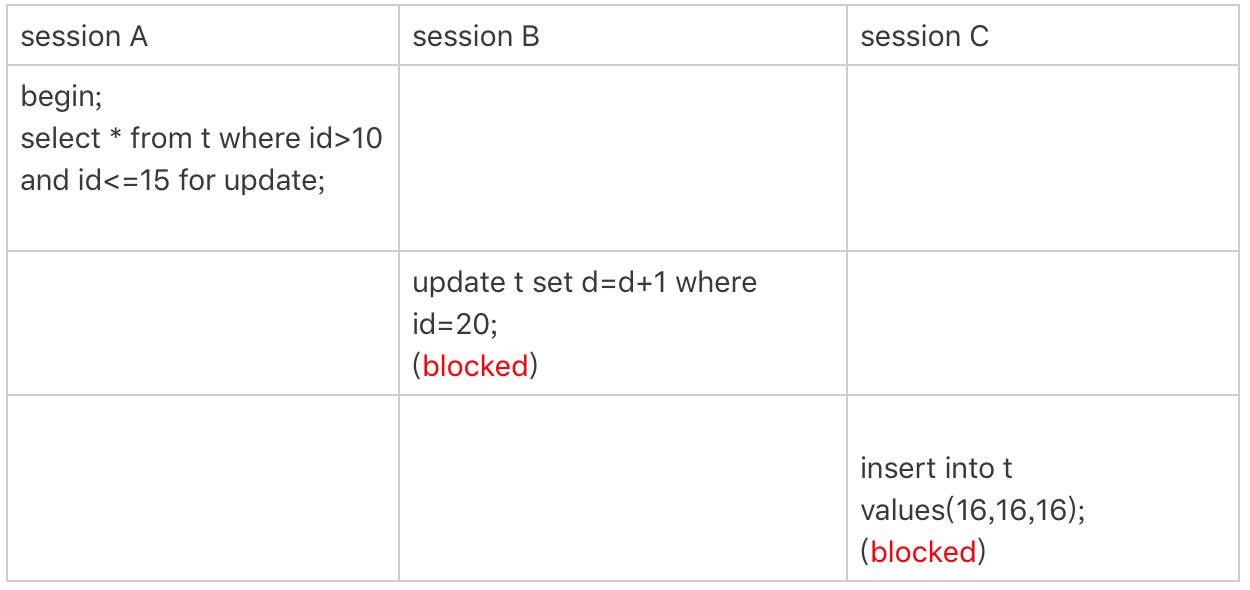在MySQL8.0.18之前,针对唯一索引或主键索引进行范围条件加锁时,向右遍历过程中,会一直扫描并加next-key锁到第一个不满足条件的记录为止,然后退化为间隙锁,但RR隔离级别下并不会退化,也就是锁的范围扩大了,严格来说这算是一个bug,这一问题直到8.0.18总算被优化了。
5.7测试结果
1
2
3
4
5
6
7
8
9
10
11
12
13
14
15
16
17
18
19
20
21
22
23
24
25
26
27
28
29
30
31
32
33
34
35
36
37
38
39
|
mysql> select version();
+------------+
| version() |
+------------+
| 5.7.17-log |
+------------+
1 row in set (0.01 sec)
mysql> select @@session.tx_isolation;
+------------------------+
| @@session.tx_isolation |
+------------------------+
| REPEATABLE-READ |
+------------------------+
mysql> select * from t;
+----+------+------+
| id | c | d |
+----+------+------+
| 0 | 0 | 0 |
| 5 | 5 | 5 |
| 10 | 10 | 10 |
| 15 | 15 | 15 |
| 20 | 20 | 20 |
| 25 | 25 | 25 |
+----+------+------+
6 rows in set (0.00 sec)
mysql> show create table t\G
*************************** 1. row ***************************
Table: t
Create Table: CREATE TABLE `t` (
`id` int(11) NOT NULL,
`c` int(11) DEFAULT NULL,
`d` int(11) DEFAULT NULL,
PRIMARY KEY (`id`),
KEY `c` (`c`)
) ENGINE=InnoDB DEFAULT CHARSET=utf8
1 row in set (0.00 sec)
|

按照正常理解,ID索引上只加(10,15]的next-key lock,并且ID是主键具有唯一性,应该到ID=15就应该退化,但实际情况会往前扫描到第一个不满足的条件为止,也就是ID=20的记录,而且由于是范围扫描,索引上会加上(15,20]的next-key lock,因此SESSION B更新ID=20的记录也会被锁住,SESSION C插入ID=16的记录同样会被锁住。
1
2
3
4
5
6
7
8
9
10
11
12
13
14
15
16
|
mysql> select * from INNODB_LOCKS;
+-------------+-------------+-----------+-----------+------------+------------+------------+-----------+----------+-----------+
| lock_id | lock_trx_id | lock_mode | lock_type | lock_table | lock_index | lock_space | lock_page | lock_rec | lock_data |
+-------------+-------------+-----------+-----------+------------+------------+------------+-----------+----------+-----------+
| 3715:43:3:6 | 3715 | X,GAP | RECORD | `test`.`t` | PRIMARY | 43 | 3 | 6 | 20 |
| 3711:43:3:6 | 3711 | X | RECORD | `test`.`t` | PRIMARY | 43 | 3 | 6 | 20 |
| 3714:43:3:6 | 3714 | X | RECORD | `test`.`t` | PRIMARY | 43 | 3 | 6 | 20 |
+-------------+-------------+-----------+-----------+------------+------------+------------+-----------+----------+-----------+
mysql> select * from INNODB_LOCK_waits;
+-------------------+-------------------+-----------------+------------------+
| requesting_trx_id | requested_lock_id | blocking_trx_id | blocking_lock_id |
+-------------------+-------------------+-----------------+------------------+
| 3717 | 3717:43:3:6 | 3711 | 3711:43:3:6 |
| 3716 | 3716:43:3:6 | 3711 | 3711:43:3:6 |
+-------------------+-------------------+-----------------+------------------+
|
在MySQL8.0.18中,后两条SQL不再会被锁住,MOS上关于改问题修复的描述如下:
1
2
3
4
5
6
7
8
9
10
11
12
13
14
15
16
17
18
19
20
21
22
23
24
25
|
commit d1b0afd75ee669f54b70794eb6dab6c121f1f179
Author: Jakub Łopuszański <jakub.lopuszanski@oracle.com>
Date: Wed Jul 17 16:34:01 2019 +0200
Bug #29508068 UNNECESSARY NEXT-KEY LOCK TAKEN
When doing a SELECT...FOR [SHARE|UPDATE] with a WHERE condition specifying a range,
we were locking "one row too much".
This patch fixes locking behaviour in several (hopefuly) most common cases, so that
we only lock rows and gaps which intersect the searched range.
- Added MTR to demonstrate current locking policy for end of range
- Got rid of goto
- Extracted logic of determining relation between range and row to separate function
- Extracted reoccuring patterns of modifications of search_tuple so it is easier to add same for stop_tuple
- Added prebuilt->m_stop_tuple and made sure it is in sync with prebuilt->m_mysql_handler->end_range for during read_range_first() and read_range_next()
- Added row_can_be_in_range field
- Do not lock the row (just the gap) if the row is same length and after the stop_tuple
- Do not lock the row (just the gap) if the row is same length and equal to stop_tuple and strict inequality was used for end of range
- Do not lock the row (just the gap) if the row is longer than stop_tuple and its prefix is after the stop_tuple
- Do not lock the row (just the gap) if the row is longer than stop_tuple and its prefixis equal to stop_tuple and strict inequality was used for end of range
- Do not lock the row nor gap if we already saw a row same length and equal to stop_tuple in previous iteration
Reviewed-by: Pawel Olchawa <pawel.olchawa@oracle.com>
RB:22293
|
